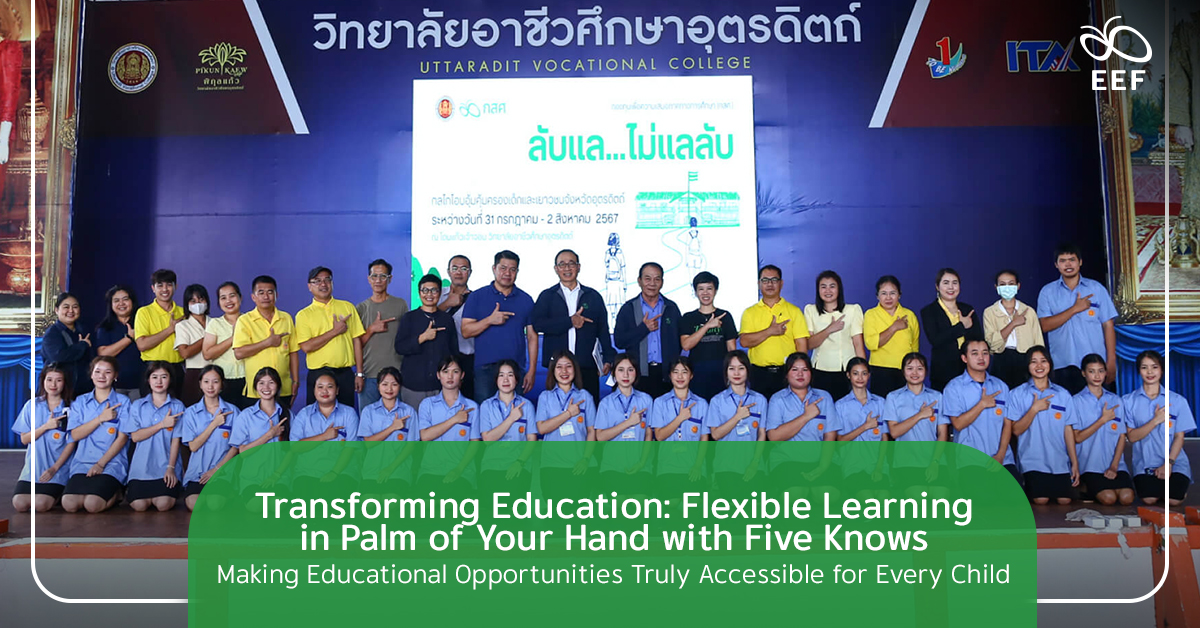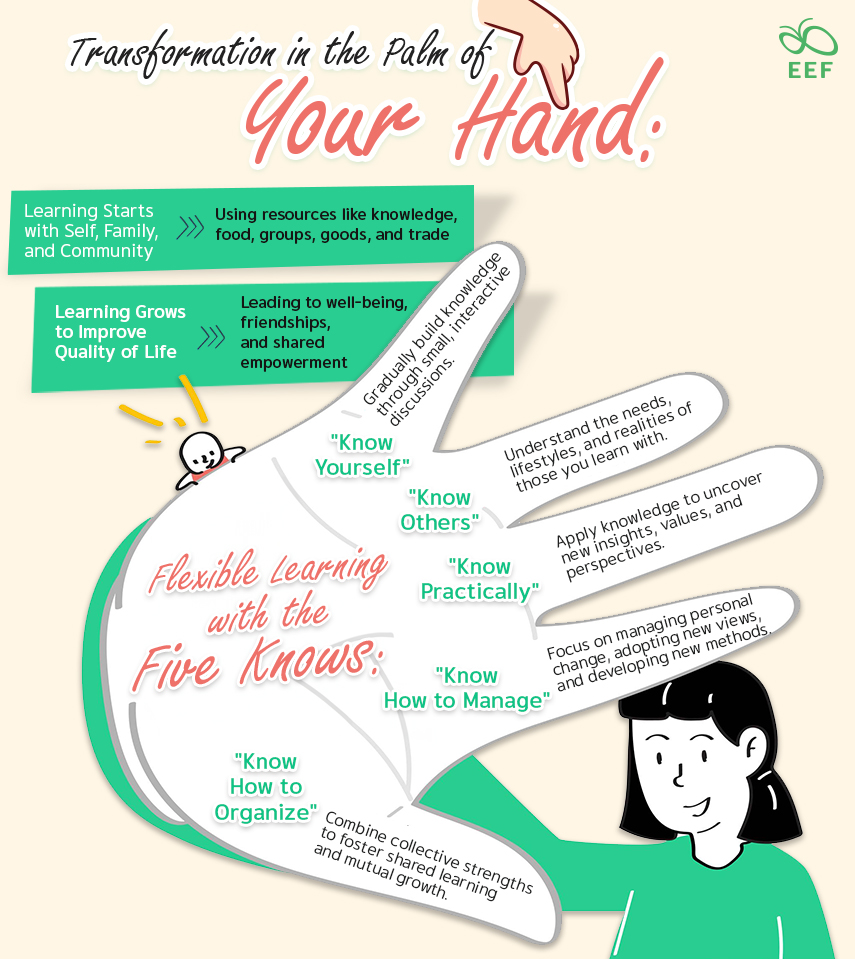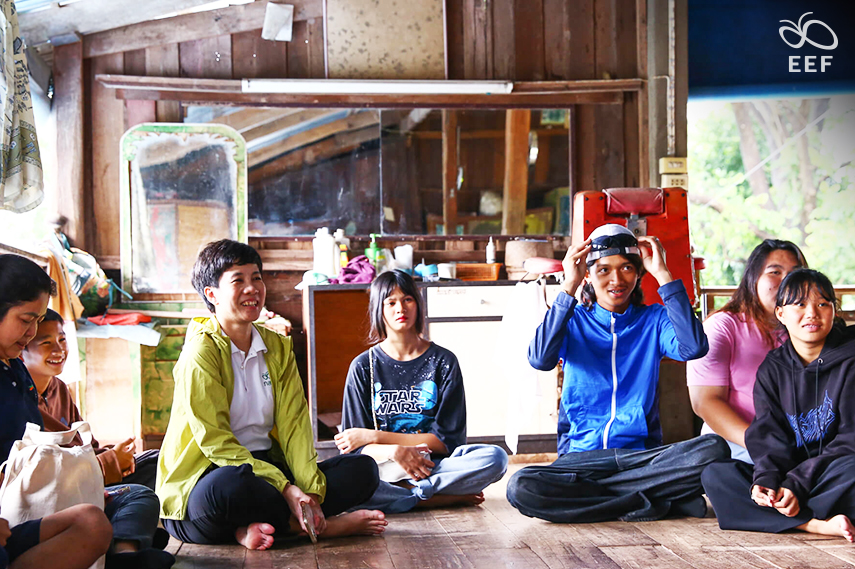
Re-engaging children who have fallen out of the educational system presents a significant challenge, as many fear returning to traditional classrooms. Forcing these students back into conventional settings risks further dropouts; thus, it is crucial to offer new educational pathways that embrace flexibility rather than confining them to traditional classroom environments. Acknowledging this reality, the Equitable Education Fund (EEF) Thailand is advancing educational opportunities through the Thailand Zero Dropout initiative. Centered on flexibility and adaptability, this initiative focuses on flexible learning environments designed to accommodate diverse preferences, aptitudes, and limitations. It aims to reintegrate out-of-school children and youth by developing support systems that ensure access to education and prevent initial and recurring dropout, offering tailored solutions for students with varying needs. Simultaneously, Uttaradit Province is moving towards implementing a model with three learning formats — formal, non-formal, and informal — within a single school. This holistic approach seeks to provide a comprehensive solution for re-engaging youths with education, ensuring effective learning and successful reintegration into society.
Uttaradit’s model benefits from a dynamic partnership with various local stakeholders, involving the Office of the Basic Education Commission (OBEC), a network of learning centers under Section 12 of the National Education Act B.E. 2542, local businesses, communities, and professionals from various fields, who play a pivotal role in advancing an educational model that addresses regional challenges. A notable achievement from this effort is the establishment of “Si-Tarang-Wa School” (16 Square Meter School). Designed to cater to diverse learners who have fallen out of the formal educational system — including disadvantaged youth, out-of-school children, and those in the juvenile justice system — this model employs a flexible, non-traditional model. By offering alternative pathways and avoiding the traditional classroom setting that many students fear, the school exemplifies how education can adapt to diverse needs. Through local cooperation and engagement with governmental and educational bodies, this model ensures that every child has the opportunity to succeed in both education and employment while rediscovering their self-worth. It underscores the importance of creating inclusive, adaptable learning environments that transcend conventional boundaries.
The following is the comprehensive framework of Si-Tarang-Wa School, a transformative educational model that tailors inclusive learning experiences for every child, breaking the boundaries of conventional schooling through collaboration, flexibility, and community-driven initiatives. This approach highlights the empowering truth that transforming education through flexible learning lies in the palm of your hand, guided by the Five Knows — essential principles that foster self-growth, shared empowerment, and a lasting impact on both individuals and communities.

The Si-Tarang-Wa School, under Uttaradit Lifelong Learning Center, an educational institution under Section 12 of the National Education Act B.E. 2542, represents a pioneering model of transformative education. This school designs flexible, alternative learning pathways tailored to the needs of diverse out-of-school students. Guided by a robust local network of educators, community leaders, and provincial agencies, the school’s curricula are aligned with non-formal education standards and place a strong emphasis on individualized instruction. By incorporating flexible learning schedules and methods, the curricula adapt to the interests, readiness, potential, and limitations of each student, ensuring that no learner is left behind. The approach also prioritizes community-owned education, where learning spaces blur the lines between freeform recreation and structured instruction, fostering holistic development. Future expansions aim to introduce both core and non-formal curricula, supported by a system to prevent dropouts and enable seamless credit transfers. These initiatives are further strengthened by complementary collaborative learning units in Chiang Mai and Phitsanulok, alongside strong partnerships with the EEF Thailand, creating a comprehensive support network that broadens access to education for all.

Transformation in learning truly lies in the palm of our hand. It starts with individuals, families, and communities harnessing diverse resources — knowledge, food, social groups, goods, and trade — to enrich their lives. This holistic approach fosters personal growth and enhances quality of life, leading to well-being, stronger friendships, and collective empowerment. Central to this process are the Five Knows: “Know Yourself,” involving developing understanding through interactive discussions; “Know Others,” focusing on appreciating the needs and realities of those around you; “Know Practically,” applying acquired knowledge to gain fresh insights and broaden perspectives; “Know How to Manage,” emphasizing adapting to change and refining methods; and “Know How to Organize,” involving leveraging collective strengths to promote shared learning and mutual advancement. Together, these principles guide a dynamic, flexible learning framework that nurtures continuous personal and communal development.

In 2021, data indicated that approximately 9,069 children and youth aged 12 to 17 in Uttaradit Province were out of the educational system, accounting for about a quarter of all local youth. These individuals, coming from both remote and densely populated areas, frequently faced issues such as poverty, violence, and drug problems, leading many to reject traditional schooling. The challenge is to establish safe spaces within the communities, supported by families and local organizations, that encourage these children to return to education. The aim is to collaboratively identify educational paths that meet each child’s specific needs, utilizing community resources and knowledge through local learning centers. Despite the concerning national figure of 1.02 million out-of-school children and youth, the flexible educational model in Uttaradit demonstrates a promising solution. This model illustrates how tailored, community-driven strategies can address extensive educational challenges. Efforts to foster collaboration among government, private, and civil sectors are focused on developing locally relevant solutions that could be scaled nationally, showcasing an effective approach to overcoming educational exclusion.

Si-Tarang-Wa School represents a pioneering model of educational transformation through flexible learning, embodying the core principle of making educational opportunities truly accessible for every child. By harnessing the Five Knows — grounded in self-awareness, understanding others, practical application, managing change, and collaborative organization — this approach adeptly addresses the immediate needs of a diverse student population while cultivating long-term personal and communal growth. This transformative vision aligns perfectly with the Equitable Education Fund (EEF) Thailand’s founding mission to mitigate educational inequality through cutting-edge research, collaborative initiatives, and targeted support for all age groups. The innovative, adaptable strategies employed in Uttaradit serve as a powerful example of how localized, community-driven models can bridge educational gaps and create scalable solutions for broader challenges. This approach not only highlights the effectiveness of flexible learning frameworks but also demonstrates how strategic, inclusive solutions can drive significant, meaningful change, ensuring that every child has the opportunity to achieve their full potential and succeed in their educational journey.

